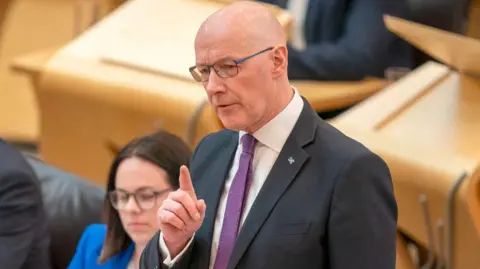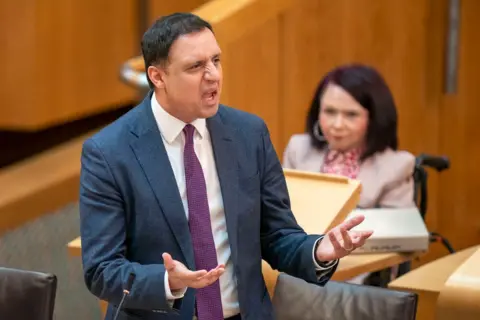What did we learn from Swinney's plan for the year?
 PA Media
PA MediaJohn Swinney's programme for government marks a year to go until the Holyrood election, and will likely define the shape of the campaign.
The first minister brought forward the set-piece speech from September in a bid to set up a "year of delivery" ahead of that crucial vote.
What did we learn from the speech, and how will it dictate what happens over the rest of the Scottish Parliament term?
Swinney aims for quick wins
The statement included a number of flagship policies which Swinney will no doubt base his election campaign on next year.
The SNP is already posting social media pictures of him posing at a train station, following the announcement that peak rail fares are to be scrapped (again).
Scrapping the two-child cap was the big announcement of the budget last year, one which struck a particular blow in the SNP's contest with Labour.
And with the NHS sure to be key in the debate to come - Anas Sarwar reliably brings it up every single Thursday - widening access to GP appointments is also an eye-catching move.
 PA Media
PA MediaWhat all of these measures have in common is that they can likely be delivered using existing powers, without having to spend time drafting legislation and pushing it through parliament.
Lifting the alcohol ban on trains falls into the same category, although the move to suspend the free bus passes of young people guilty of anti-social behaviour seems less certain in its form or timescale.
These policies essentially amount to quick wins, popular ideas that Mr Swinney can spend time campaigning about rather than worrying about whipping up votes.
Even the speech itself was relatively short, as these things go - perhaps deliberately projecting the image of a government keen to get on with the job and get straight into the next debate.
Opposition leaders decried it as a "flimsy" programme, short on substance - but ultimately it's the outcomes which will matter come polling day.
A sharper focus
As noted above, Swinney's big ideas in this speech mostly won't require a huge amount of parliamentary process.
Indeed, there was relatively little in the way of new legislation announced.
Only five extra government bills will be tabled in the coming year, including the annual budget bill.
The bills are also very much not the headlines from the speech. Perhaps the most interesting one involves stronger regulation of cosmetic surgeries such as the "Brazilian butt lift", which apparently has been patiently explained to the first minister.
In fairness this is often the way at the end of a term. There are already 16 government bills in the pipeline, including education, housing and land reform legislation. MSPs and committees have plenty to be getting on with.
But Swinney has also kicked some potentially thorny issues into the long grass, confirming at the top of his speech that efforts to criminalise misogynistic behaviour and ban conversion therapy will have to wait until next term.
It is fair to reflect that it takes time to get a legally watertight bill through parliament, and the government is being very careful about the Supreme Court ruling on gender.
But Swinney is clearly very keen to get away from those kind of debates.
You can almost see him honing the SNP's electoral message, focusing it down to the core issues that activists will put across on the doorsteps next May.
A change of tone
This statement also marks a year since John Swinney took over as Scotland's first minister, and it's striking what a difference a year makes.
He stepped in as SNP leader amid one of the most difficult periods in the party's modern history.
Humza Yousaf's self-inflicted downfall came after scarcely a year in office, which was overshadowed by an ongoing police investigation, disquiet on the back benches and no more majority in parliament with the end of the SNP-Green partnership.
And it didn't get any easier for Swinney, as he was immediately pitched into a general election campaign where the SNP took a hammering.
 PA Media
PA MediaBut that all feels like a distant memory when you look at the first minister who was confidently sparring with opposition leaders today. He appears to be having a great time.
Swinney has always relished the cut and thrust of parliamentary debate, but he clearly feels he's steadied the ship and is now ready to kick on.
The turning point was probably the budget last autumn, which made a notable shift to talk of "hope" and delivery - as well as giving Labour a bloody nose at a point the party was struggling to settle into power at Westminster.
He has consistently positioned himself at the head of the debate, seeking to set the tone and narrative rather than react to what others are doing.
At the turn of the year, Swinney said he felt he had put the SNP back on the front foot and intended to keep them there.
This programme - both the attractive retail policies and the shelving of potentially trickier challenges - is designed to deliver that.
Political philosophy
One question for the first minister is how he handles the broader atmosphere around our politics, and we got a glimpse of his philosophy today.
There has been a lot of talk about change in contemporary politics.
The general election was obviously dominated by it, and last week's local elections in England suggest that parties offering a radical upending of the status quo are an attractive proposition with the electorate.
Swinney recognises this - he nodded to the anxiety that people are feeling in an uncertain era. "Times are tough, and times are changing."
But how is the leader of an incumbent government heading into its 19th year in power to handle such an anti-politics mood?
Despite its broader goal of independence, the SNP is going to struggle to present itself as an anti-establishment insurgent.
So instead he is positioning his party as a rock of stability in turbulent waters.
Swinney says he will always put the "needs and interests, the hopes and dreams of the people of Scotland first".
And crucially he says he has been listening to people, and has heard their concerns "loud and clear".
Bundle it all together and this is Swinney's strongest response to the challenge of populism, not his "anti-far right summit" or rhetoric about Reform UK.
It's about telling people that their fears and anxieties about our fast-changing world are being listened to, and taking action to improve their lives.
Campaign already clear
For all that, this statement fires the starting gun for an election 366 days away, the shape of the campaign has been clear for some time.
John Swinney has made his priorities clear: a "year of delivery" on the issues that matter to Scots.
He has steadied the ship and trimmed away more controversial policies, and is seeking to lead the debate going into the election period.
The responses in the chamber were familiar too.
The Scottish Conservatives paint Swinney as the "same old" politician that's spent most of the last 20 years in government - and even managed to bring up the topic of independence, the issue they love the most, while also insisting we all need to move on from it.
Scottish Labour has been very clear for a long time that it will be campaigning chiefly on the NHS as a case study of SNP failure after decades in charge.
So they were particularly aggrieved that Swinney focused on the "8am lottery" for GP appointments, given ending the "8am rush" was a big part of Anas Sarwar's conference speech earlier this year.
But that's just life in opposition. If you're the third party in the parliament you can have all the good ideas you like, but it's the government that actually gets to get on with doing stuff.
How all of this talk goes down with the electorate will ultimately decide who it is in the delivery role next spring.
